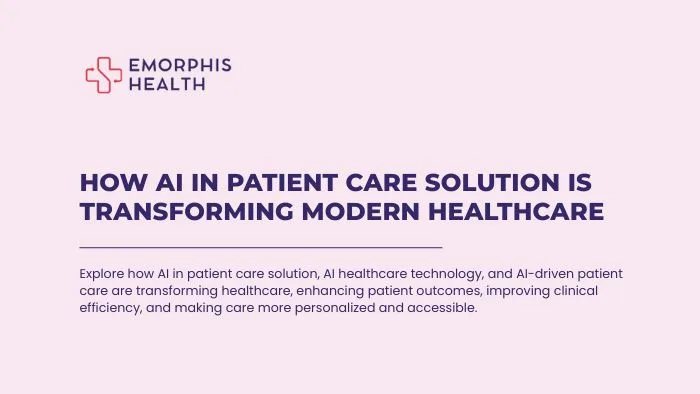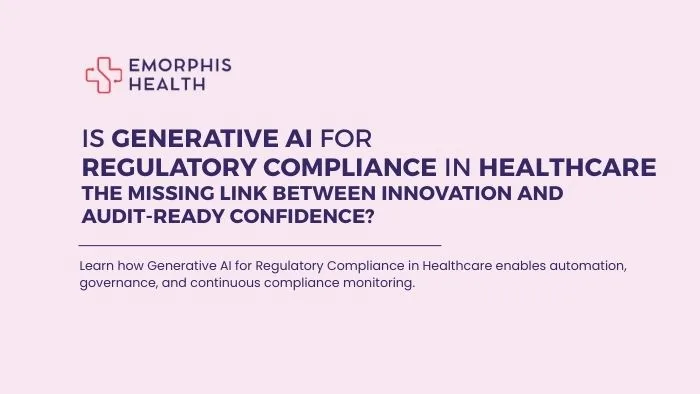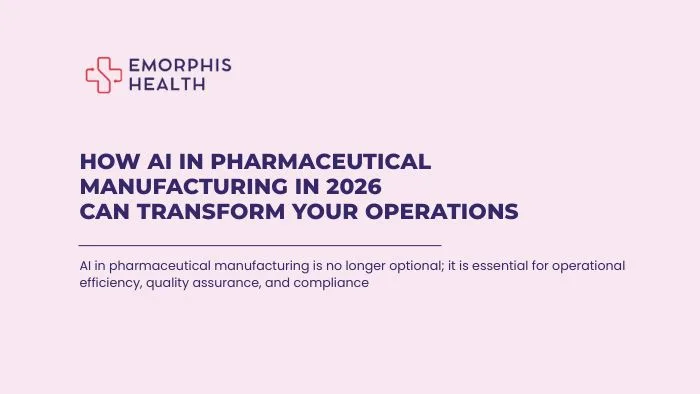The New Era of Patient-Centered Healthcare
See Contents
- 1 The New Era of Patient-Centered Healthcare
- 2 What is AI in Patient Care Solution?
- 3 Key Benefits of AI in Patient Care Solution
- 4 Diverse Applications of AI in Patient Care Solution
- 5 Data Security and Compliance in AI-Powered Patient Care
- 6 Future Trends in AI in Patient Care Solution
- 7 Conclusion: The Road Ahead for AI-Driven Patient Care
Healthcare is undergoing a significant transformation, with a strong emphasis on patient-centered care. Patients today expect swift, accurate, and personalized treatment. To meet these expectations, hospitals and clinics are increasingly adopting advanced technologies. One of the most influential innovations driving this change is the integration of AI in patient care solutions.
AI is making rounds in hospitals, literally. In 2024, two-thirds of physicians are using health AI, marking a 78% surge from 2023. According to a 2024 report by the American Medical Association, 66% of physicians have incorporated AI into their practice, marking a 78% increase from the previous year.
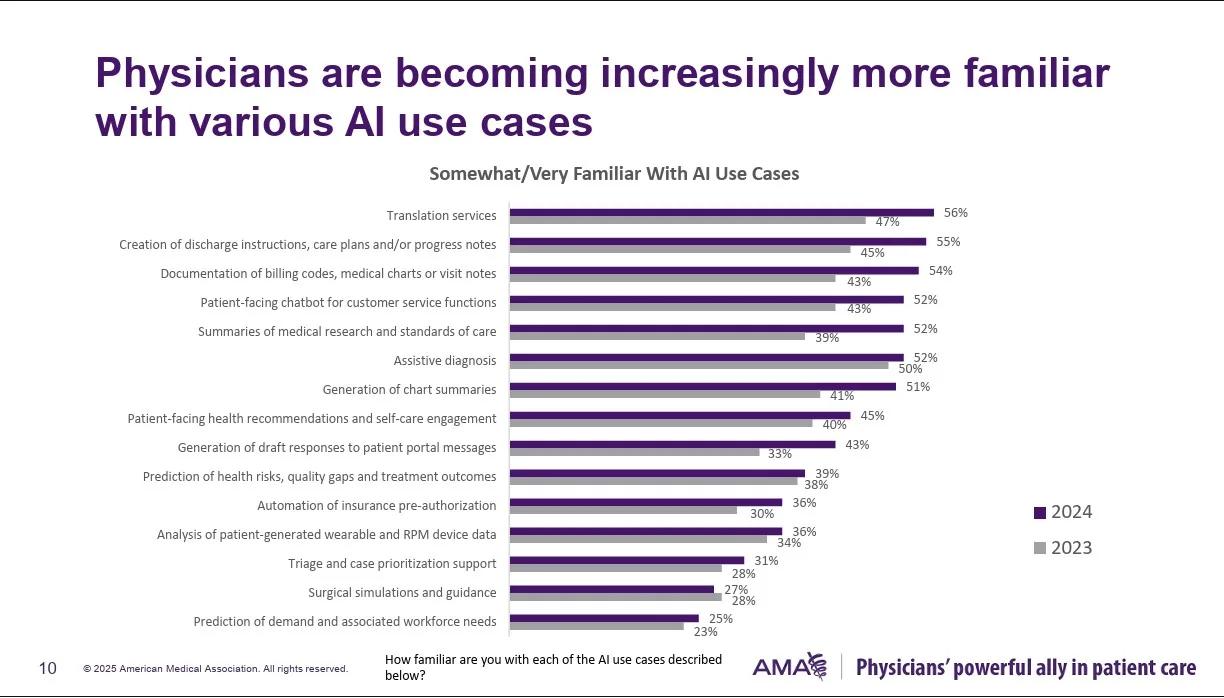
Additionally, the global AI in healthcare market is projected to grow from $26.69 billion in 2024 to approximately $613.81 billion by 2034, reflecting a compound annual growth rate (CAGR) of 36.83% . These developments signify the dawn of a new era where healthcare becomes more responsive, efficient, and accessible through the adoption of AI-driven patient care solutions.
Explore how a patient management system simplifies clinical workflows, improves patient tracking, and enhances operational efficiency in healthcare.

What is AI in Patient Care Solution?
AI in patient care solution refers to using artificial intelligence technologies to support and enhance various aspects of patient care. It involves smart systems that can analyze data, learn from patterns, and make accurate decisions to assist doctors, nurses, and even patients. These solutions can help with everything from checking symptoms and suggesting treatments to monitoring vital signs and alerting medical teams in emergencies. AI doesn’t replace doctors, moreover, it supports them by offering faster insights and better tools to care for patients effectively.
Key Benefits of AI in Patient Care Solution
1. AI in Patient Care Solution Saves Time Through Automation
One of the most immediate and noticeable benefits of AI in patient care solution is time savings. By automating repetitive administrative tasks, such as scheduling, billing, medical record entry, and follow-up notifications, AI systems reduce the workload for healthcare staff. Clinicians spend less time on paperwork and more time interacting with patients. In busy hospital environments, AI-powered automation tools streamline workflows, reduce wait times, and help keep daily operations running smoothly.
2. AI in Patient Care Solution Enables Early Detection of Health Issues
Early diagnosis can be the difference between life and death. AI in patient care solution leverages data from electronic health records (EHRs), wearable devices, and past medical imaging to detect patterns that may signal the early stages of conditions like cancer, diabetes, or heart disease. Predictive models can flag high-risk patients before symptoms appear, giving providers a chance to intervene early. This proactive approach not only improves outcomes but also reduces the need for costly emergency care.
3. AI in Patient Care Solution Supports Personalized Treatment
AI transforms one-size-fits-all care into tailored therapy plans. By analyzing a patient’s health data—including genetics, lifestyle habits, past treatments, and responses to medications—AI in patient care solution helps physicians design highly personalized treatment plans. This is especially valuable in complex areas like oncology, where two patients with the same diagnosis might require entirely different therapies. AI’s ability to continuously learn and adapt ensures that treatments remain effective over time.
Unlock the power of patient care management software to deliver personalized care, improve outcomes, and streamline provider-patient communication.
4. AI in Patient Care Solution Improves Patient Safety
Mistakes in medication, misdiagnosis, or overlooked symptoms can have serious consequences. AI in patient care solution plays a critical role in enhancing safety by double-checking prescriptions, identifying harmful drug interactions, and providing clinical decision support. AI also ensures greater consistency in diagnostic imaging by highlighting anomalies that may be missed by human eyes. Real-time alerts notify clinicians about potential risks, helping to prevent adverse events and improving trust in the system.
5. AI in Patient Care Solution Expands Access to Care
In rural and underserved communities, access to skilled healthcare professionals is often limited. AI in patient care solution bridges this gap by enabling remote consultations, real-time health monitoring, and automated triage. Patients can interact with AI chatbots, receive health advice, or even get a preliminary diagnosis without leaving their home. This democratization of care reduces barriers such as travel, wait times, and language, ensuring that high-quality care is available to everyone, regardless of location.
6. AI in Patient Care Solution Enhances Decision-Making for Clinicians
AI serves as a powerful decision-support tool, helping doctors make faster and more informed choices. By quickly analyzing complex datasets and presenting actionable insights, AI in patient care solution reduces cognitive load on physicians. It can suggest possible diagnoses, recommend treatment options based on the latest research, and prioritize critical cases. This support system not only boosts clinical accuracy but also helps reduce burnout among healthcare professionals.
7. AI in Patient Care Solution Encourages Continuous Monitoring and Follow-Up
Many patients with chronic conditions require constant monitoring. AI in patient care solution allows for seamless and non-intrusive tracking of vital signs, glucose levels, or heart rhythms via wearable devices. The AI continuously analyzes this data and notifies both the patient and healthcare provider if intervention is needed. It also reminds patients about checkups, medication refills, and lifestyle changes, ensuring long-term adherence to care plans.
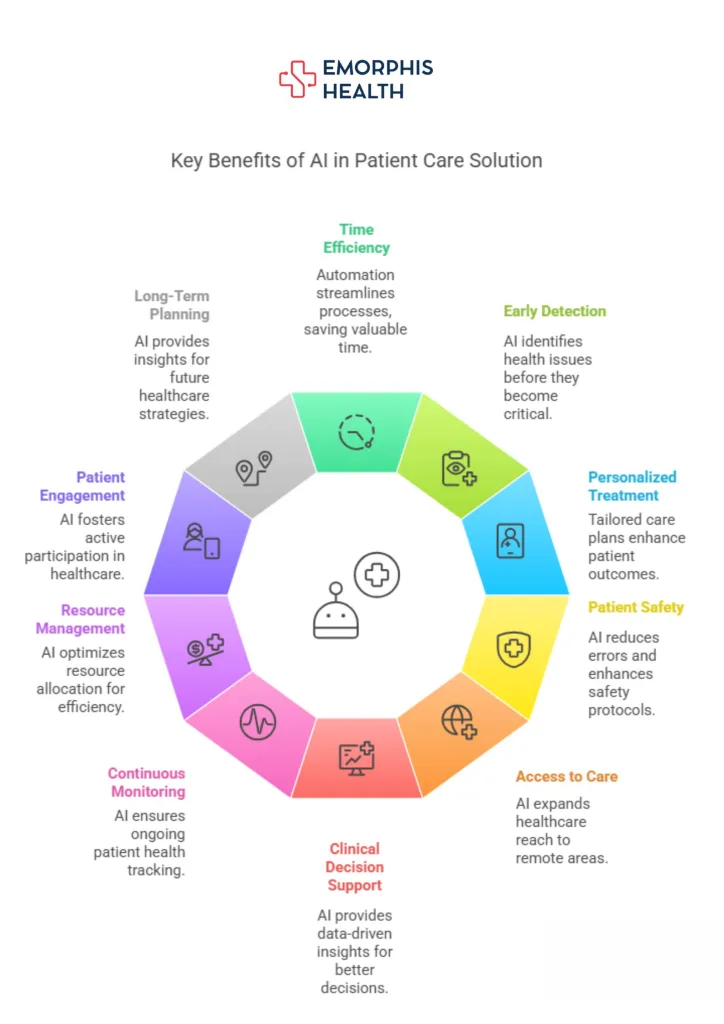

8. AI in Patient Care Solution Promotes Better Resource Management
Hospitals and clinics often struggle with resource allocation. AI helps optimize staffing, predict patient admission rates, and manage bed occupancy efficiently. It can also forecast medication stock needs and adjust supply chain logistics accordingly. These capabilities ensure that resources are used where they’re most needed, ultimately improving patient throughput and reducing operational costs.
9. AI in Patient Care Solution Boosts Patient Engagement
Patients who are actively involved in their care tend to have better outcomes. AI in patient care solution encourages engagement through interactive mobile apps, virtual assistants, and real-time health education tools. Patients can ask questions, track their health metrics, and receive personalized advice, empowering them to make informed decisions about their well-being.
10. AI in Patient Care Solution Ensures Data-Driven Insights for Long-Term Planning
With AI continuously collecting and analyzing patient data, healthcare organizations can gain valuable insights into population health trends, treatment effectiveness, and emerging risks. This allows for better strategic planning, public health interventions, and even research advancements. Over time, this data-centric approach helps create a smarter, more resilient healthcare system.
Learn how to scale your healthcare product idea with expert strategies in development, compliance, and market fit for long-term success in digital health.
Diverse Applications of AI in Patient Care Solution
Across healthcare settings, AI in patient care solutions is used in many ways to make care smarter and more effective. It plays a role in helping doctors analyze large amounts of medical data quickly, making it easier to diagnose conditions accurately and at an early stage. AI is also used to track patients’ health remotely, allowing doctors to respond quickly when something changes.
Patients can interact with AI tools to get health information, reminders, or support without having to visit a clinic. These solutions not only speed up care but also make it more tailored to each individual’s needs. By handling routine tasks and analyzing complex information, AI allows healthcare professionals to focus more on what truly matters—taking care of the patient.
1. AI Virtual Health Assistants
Description:
AI virtual health assistants are intelligent bots (chat-based or voice-enabled) that simulate human interactions to guide patients through their healthcare journey.
Key Features:
- 24/7 availability for answering health-related queries
- Symptom checker using NLP and machine learning
- Automated appointment scheduling and reminders
- Medication reminders and refill alerts
- Multilingual support and adaptive conversations
- Integration with EHR to provide personalized responses
- Escalation to human support when necessary
Use Case:
Enhances patient engagement and reduces workload on administrative staff by handling routine queries and tasks.
2. Remote Patient Monitoring (RPM) Systems
Description:
These AI-powered systems continuously track patients’ vital signs through wearable devices or IoT sensors and analyze the data in real-time.
Key Features:
- Real-time tracking of heart rate, blood pressure, oxygen saturation, glucose levels, etc.
- AI algorithms detect anomalies and trigger alerts
- Dashboards for both patients and care providers
- Trend analysis for chronic condition monitoring
- Predictive alerts for potential emergencies
- Integration with mobile apps for patient access
- HIPAA-compliant data transmission and storage
Use Case:
Ideal for managing chronic diseases and post-operative patients from home, minimizing hospital readmissions.
3. Predictive Analytics Platforms
Description:
AI-powered platforms that process large volumes of patient data to identify patterns and predict future health outcomes.
Key Features:
- Early detection of diseases like cancer, sepsis, or cardiac arrest
- Risk scoring for hospital readmissions
- Identification of at-risk patients based on real-time and historical data
- Integration with EHR for automated data input
- Customizable dashboards and reports for clinicians
- Alerts for preventive intervention opportunities
- Population health management
Use Case:
Used by hospitals to allocate resources efficiently and intervene early for high-risk patients.
4. AI-Powered Diagnostic Tools
Description:
These tools use computer vision and machine learning to interpret medical images and lab results for accurate diagnoses.
Key Features:
- Image analysis for X-rays, MRIs, CT scans, ultrasounds
- Automated detection of anomalies like tumors, fractures, or infections
- Accuracy comparable to or exceeding human experts
- Real-time assistance during diagnostic procedures
- Integration with PACS and radiology information systems
- Continuous learning through new data inputs
- Regulatory compliance (FDA, CE-certified in many cases)
Use Case:
Speeds up the diagnostic process, especially in radiology and pathology departments.
5. Personalized Treatment Planning Systems
Description:
AI tools that recommend custom treatment plans based on each patient’s genetic profile, lifestyle, and clinical data.
Key Features:
- Analysis of genomics, proteomics, and lifestyle data
- Use of historical outcomes to suggest optimal therapies
- Adaptive treatment pathways based on patient progress
- Drug interaction and allergy warnings
- Support for precision medicine in oncology and rare diseases
- Seamless communication with clinicians for plan adjustments
- Visualization tools for patient understanding
Use Case:
Supports precision medicine initiatives, offering better outcomes with reduced side effects.
6. Chronic Disease Management Platforms
Description:
These platforms empower patients and care teams to monitor, manage, and treat chronic conditions like diabetes or hypertension effectively.
Key Features:
- Daily symptom tracking via wearables and mobile input
- Personalized health recommendations and lifestyle tips
- AI coaching for behavior change
- Automated alerts for out-of-range readings
- Video and chat consultations with specialists
- Integration with fitness trackers and diet apps
- Remote access for family members or caregivers
Use Case:
Improves long-term outcomes and patient adherence in managing lifelong conditions.
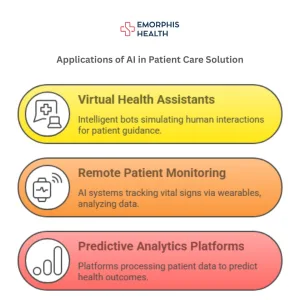

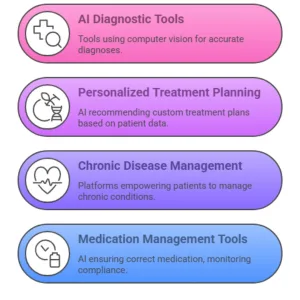
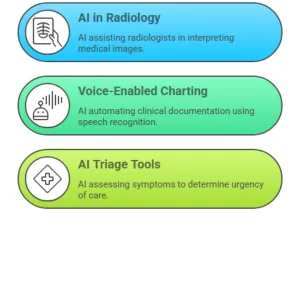
7. Medication Management and Adherence Tools
Description:
AI tools that ensure patients take the right medication at the right time while monitoring for compliance and effectiveness.
Key Features:
- Smart reminders based on prescription schedules
- Real-time adherence tracking through mobile apps
- AI algorithms flag non-compliance or misuse
- Pill recognition through camera input
- Alert caregivers or doctors if doses are missed
- Drug interaction checker
- Patient education modules on medication use
Use Case:
Reduces the risk of medication errors, especially in elderly or multi-drug patients.
8. AI in Radiology and Imaging
Description:
AI solutions that assist radiologists in interpreting complex medical images more accurately and efficiently.
Key Features:
- Deep learning models trained on large datasets
- Detection of subtle patterns missed by humans
- Prioritization of critical cases in worklists
- AI-generated radiology reports
- Continuous learning for improved diagnostic precision
- Workflow integration with DICOM viewers and PACS
- Decision support with probability-based findings
Use Case:
Improves diagnostic speed and quality, particularly in high-volume imaging centers.
9. Voice-Enabled Charting and EHR Automation
Description:
AI systems that use speech recognition and NLP to automate clinical documentation during consultations.
Key Features:
- Real-time transcription of doctor-patient conversations
- Conversion of natural speech into structured EHR entries
- Reduction in manual data entry time
- Smart templates and autofill suggestions
- Context-aware voice commands for navigation
- Integration with existing hospital systems
- HIPAA-compliant voice data storage
Use Case:
Enhances clinician productivity and allows for more patient-facing time.
10. AI-Based Triage and Emergency Response Tools
Description:
AI systems that assess patient symptoms to determine urgency and route them to the right level of care.
Key Features:
- Symptom checker with triage level predictions
- Integration with telemedicine platforms
- AI-driven call center support during emergencies
- Automated prioritization of ER patients
- Resource allocation recommendations
- Multi-language and voice-enabled interface
- Learning from past emergency patterns
Use Case:
Used in emergency departments and telehealth to streamline decision-making and reduce waiting times.
Discover top home care software solutions that streamline patient care, improve caregiver coordination, and enhance healthcare delivery at home.
Data Security and Compliance in AI-Powered Patient Care
As AI continues to revolutionize patient care, ensuring data security and compliance remains a top priority. Patient health data is incredibly sensitive, and its protection is critical to maintaining trust between healthcare providers and patients. AI in patient care solution relies heavily on data, such as electronic health records (EHRs), diagnostic results, and real-time monitoring information, and this data must be safeguarded to prevent breaches or misuse.
Compliance with regulations like the Health Insurance Portability and Accountability Act (HIPAA) in the U.S. and General Data Protection Regulation (GDPR) in Europe is essential for AI systems in healthcare. These regulations mandate that patient information is encrypted, securely stored, and only shared with authorized parties. AI systems must also be designed to ensure that data processing is transparent and ethical, with patients fully aware of how their data is being used.
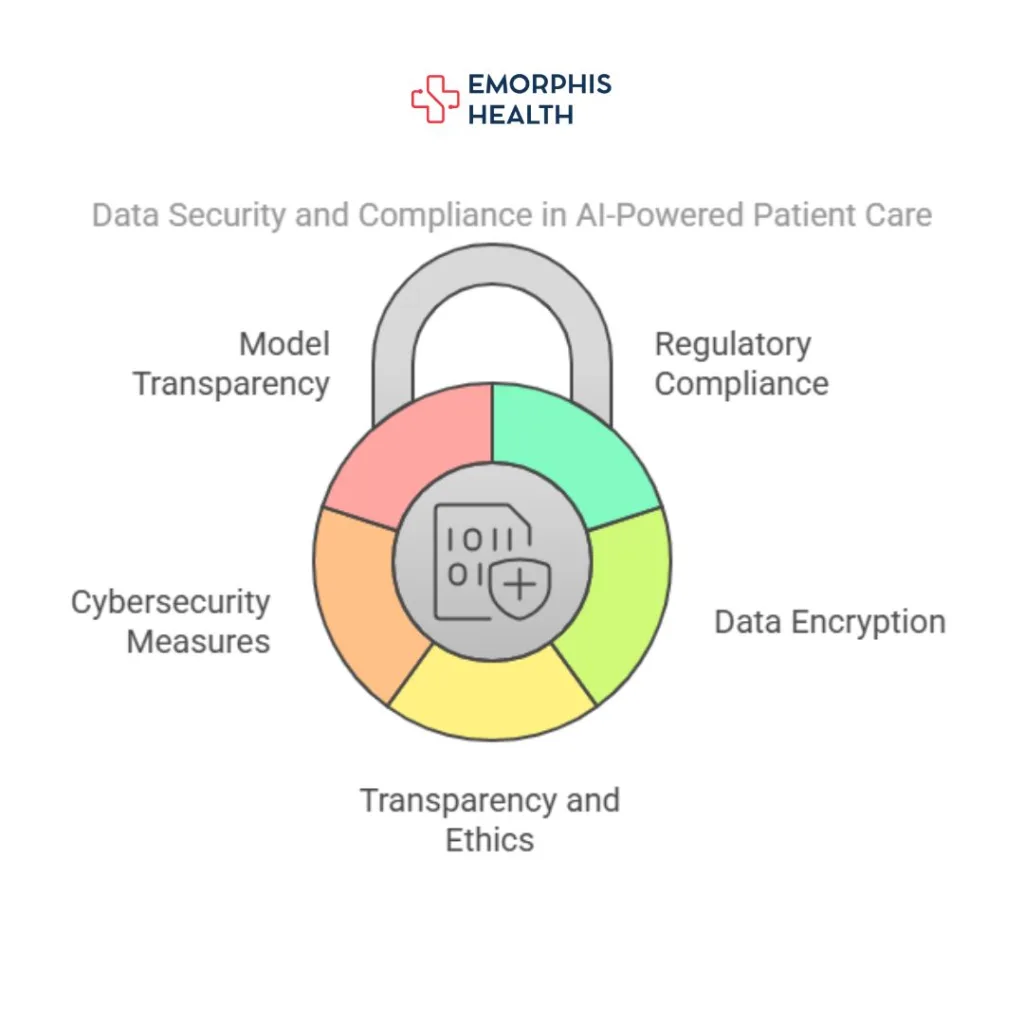

In addition, AI systems must have built-in security measures to prevent hacking, unauthorized access, and data leaks. Machine learning models used in healthcare must be transparent enough for clinicians to understand how decisions are being made, ensuring that AI-driven actions are auditable and verifiable. As AI continues to evolve, healthcare providers must stay ahead of cybersecurity threats to ensure that patient care remains safe and compliant.
Future Trends in AI in Patient Care Solution
The future of AI in patient care solution holds incredible promise, with numerous trends likely to shape the healthcare landscape. Here are a few key developments to watch:
1. Increased Integration of AI with Telemedicine
Telemedicine has experienced significant growth in recent years, and AI will continue to enhance remote healthcare services. With AI, virtual consultations can be made more efficient through automated diagnostic tools, AI-driven triage systems, and virtual assistants that help guide patients through consultations. This trend will continue to expand, offering remote care that feels as personalized and responsive as an in-person visit.
2. Advancements in Precision Medicine
As AI becomes more adept at analyzing genomic and molecular data, we can expect a greater focus on precision medicine—treatments tailored to individual genetic profiles. AI will enable even more personalized therapies, particularly in oncology, where AI tools help design treatments specific to the patient’s unique cancer profile.
3. AI in Surgery and Robotic Assistance
AI-powered robotic surgery is already in use in many leading hospitals. These systems provide unparalleled precision, reduce human error, and improve recovery times. In the future, AI-assisted robots will likely become more autonomous, helping perform complex surgeries with minimal human intervention while providing real-time decision support to surgeons.
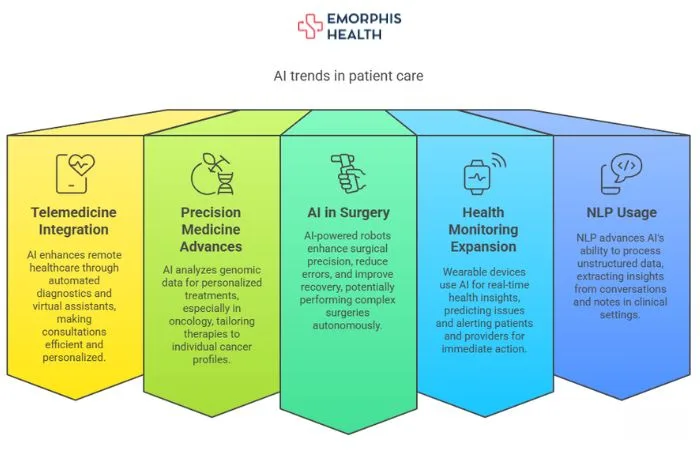

4. Expansion of AI-Powered Health Monitoring Devices
Wearable devices that track heart rate, blood sugar, and other vital signs are increasingly using AI to provide real-time health insights. In the future, these devices will offer even more detailed monitoring, predicting potential health issues before they become acute, and sending alerts to both patients and healthcare providers for immediate action.
5. Greater Use of Natural Language Processing (NLP)
NLP technologies will continue to advance, enabling AI systems to better understand and process unstructured data like doctor-patient conversations and handwritten notes. This will make AI tools even more effective in clinical environments, allowing them to extract valuable insights from a wider range of information sources.
See how healthcare technology and patient care solutions drive patient satisfaction in healthcare, improve engagement, and build lasting provider-patient relationships.
Conclusion: The Road Ahead for AI-Driven Patient Care
The future of AI in patient care is filled with innovation and challenges. As AI technologies advance, healthcare systems will see improved patient outcomes, operational efficiency, and broader access to care. AI will empower clinicians to make faster, more accurate decisions, while patients enjoy more personalized and accessible healthcare. However, as AI evolves, so must our approach to data security, privacy, and ethics.
AI in patient care solutions holds the power to transform healthcare delivery, making it smarter and more efficient. Achieving this future requires careful planning, collaboration, and continued investment in technology and security. For AI software development experts, this offers a unique opportunity to shape the next generation of healthcare technologies, focusing on creating innovative, secure, and scalable AI solutions that will drive the industry forward.

